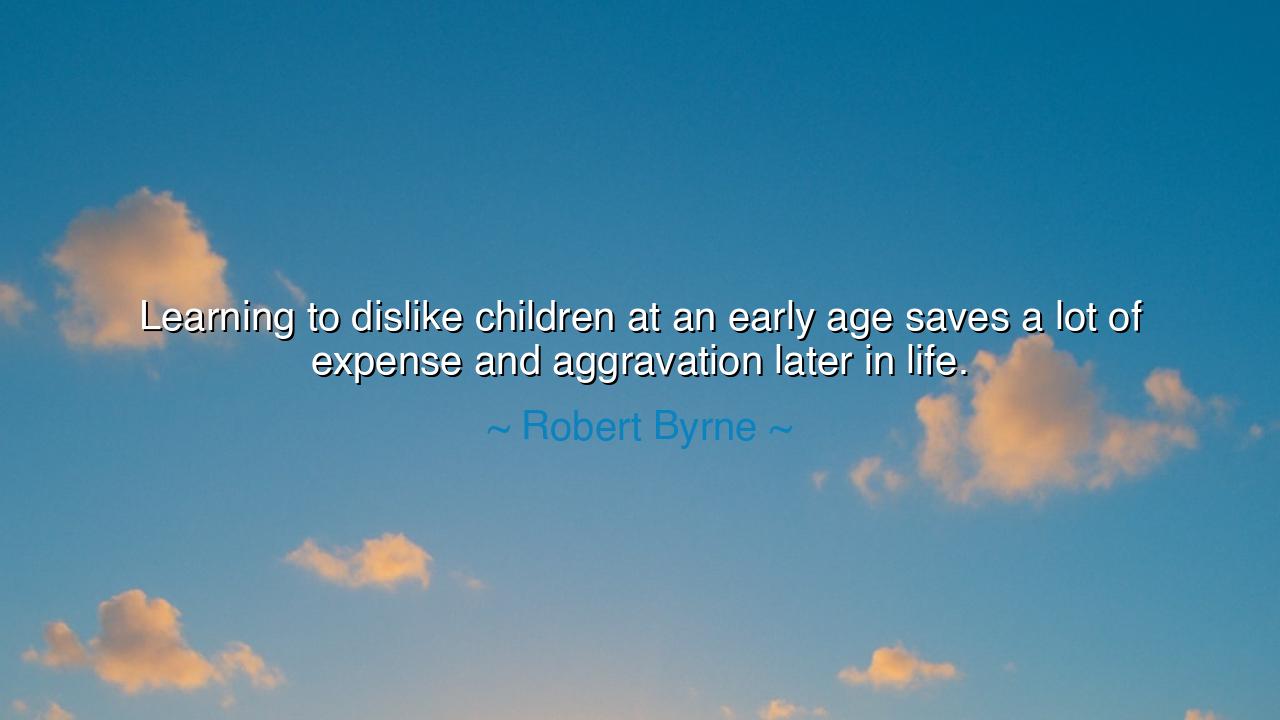
Learning to dislike children at an early age saves a lot of
Learning to dislike children at an early age saves a lot of expense and aggravation later in life.






When Robert Byrne wrote, “Learning to dislike children at an early age saves a lot of expense and aggravation later in life,” he clothed irony in the garb of wisdom. The line, though humorous and sharp-edged, hides beneath its jest a reflection on the nature of responsibility, the burdens of adulthood, and the ways people navigate the expectations of society. Byrne, a humorist and philosopher of the ordinary, often used wit to expose uncomfortable truths — and this saying, like many of his, dances on the border between laughter and insight.
The origin of this quote rests in Byrne’s body of work as a writer and columnist, known for his aphorisms that use humor to reveal the contradictions of human life. His words here are not meant to encourage cruelty or cynicism, but to provoke thought about how people approach the future — whether they face it with courage and compassion or seek to avoid its difficulties through detachment. To “dislike children” in this context is to reject the demands of nurturing and selflessness; it is a satire upon those who, fearing responsibility, build lives centered only around their own comfort.
The ancients would have recognized in Byrne’s jest a familiar lesson about the cost of love and duty. The philosopher Epictetus taught that attachment brings pain — yet he also said that to live without it is to live without humanity. Likewise, the Stoics believed that one who tries to escape life’s obligations in pursuit of ease ends up poorer in spirit than the one who bears hardship with grace. Byrne’s line captures that same paradox: it is easier to mock the burdens of parenthood than to shoulder them, yet those burdens are what give life depth and meaning.
In history, we can see both kinds of people — those who fled responsibility, and those who embraced it despite the cost. Marcus Aurelius, emperor and philosopher, ruled an empire while raising his children amid war and plague. He wrote in his Meditations that the true measure of virtue lies in service, not comfort. Compare this to Diogenes the Cynic, who lived in a barrel and mocked family, wealth, and obligation alike. Both men sought truth, but only one built a legacy that touched generations. Byrne’s joke mirrors this eternal divide — between those who seek to avoid “expense and aggravation” and those who accept them as the price of love, community, and posterity.
There is also a social truth within his humor. In the modern age, the cost of raising children — materially and emotionally — can seem overwhelming. The joke thus resonates because it plays upon a hidden anxiety: that to care deeply, to nurture life, is to open oneself to pain and sacrifice. Byrne exposes this fear by exaggerating it, turning it into a mock philosophy of convenience. Yet in laughing at his words, we are invited to recognize their absurdity — for what life would remain if all people chose the path of least responsibility? Without those willing to nurture the next generation, society itself would decay, becoming rich in comfort but poor in meaning.
Thus, beneath the humor lies a quiet admonition. Byrne reminds us that ease is not the same as happiness. To flee from the trials of care, of teaching, of guiding the young, may spare one temporary frustration, but it robs the soul of its noblest calling — to pass on wisdom and compassion to those who follow. The “expense” he mentions is real, but so too is the reward: the joy of seeing another life blossom because of your effort. In mocking detachment, he calls us back to connection.
The lesson, then, is this: responsibility, though heavy, refines the heart. Do not fear the demands of care, for they are the forge of virtue. Laugh, as Byrne would have you laugh, but know that true peace is not found in avoidance, but in the quiet strength that comes from serving life itself — whether through raising a child, mentoring the young, or contributing to the world that will outlive you.
So, my children, take this jest as a mirror. Smile at its wit, but see through it the deeper truth: that the cost of love is far less than the cost of a life lived only for oneself. For it is better to bear the “aggravation” of nurturing the future than to live untouched by it — rich perhaps in coin, but poor in purpose.






AAdministratorAdministrator
Welcome, honored guests. Please leave a comment, we will respond soon